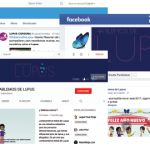(Reuters Health)—Online socializing may weaken the tie between pain and depression for older people, a U.S. study suggests. People in chronic pain are at risk of depression to start with. When pain makes them stay home more, interacting with friends and family less, it only adds to this risk, the researchers write in the Journals…

COIN Launches Playbook to Reach Young Adult Audiences
The ACR’s Collaborative Initiatives (COIN) department develops and tests innovative solutions for complex rheumatology care problems. “All of the work COIN does—programs toward health equity, creating models to increase rheumatology-related capacity in places of need, building bridges with local and national patient organizations—is done on [behalf of its members],” says Dr. David Daikh. Each month…

Medical Tech-Tool Usage Is Surging
Technology in medicine is no longer new or trendy. It’s pervasive. Rheumatologists may now assume a patient has searched online for information about his or her diagnosis or potential therapies. Both physicians and rheumatology health professionals should acknowledge their patients’ Internet surfing and find out what they’ve read, says Betsy Roth-Wojcicki, RN, MS, CPNP, an…

Social Media Connects, Informs Rheumatologists
When Paul Sufka, MD, a rheumatologist with HealthPartners Medical Group and Regions Hospital in St. Paul, Minn., wants to connect with his colleagues or keep abreast of the latest rheumatology journal articles, he turns to Twitter. Dr. Sufka is one of many rheumatologists who have found effective ways to incorporate social media into their medical…

Social Media Campaign for Latin Lupus Sufferers
A person living with lupus may feel isolated. They receive information from their doctor, but it’s never enough to fully understand the disease. So where do they turn? Social media, where they can connect, share information and learn. A new social media initiative, Hablemos de Lupus—which translates to Let’s Talk About Lupus—focuses on sharing…
Social Media May Help Chronically Ill Connect to Doctors, Fellow Patients
(Reuters Health)—Social media groups that bring together patients, family, friends and healthcare providers can improve patients’ outlook and reduce their anxiety and depression, a recent U.S. study suggests. In a nine-month experiment with liver-transplant patients, researchers found that participants came to rely heavily on a closed Facebook group, both for information about their condition and…

Advocacy in the Social Media Era
Advocacy efforts in the medical profession are evolving as technology evolves. The rise of social media, in particular, has brought about great change in the way organizations, such as the ACR, interact with Congress. At the 2017 ACR/ARHP Annual Meeting, Nov. 3–8 in San Diego, former Sen. Tim Hutchinson (R-Ark.) will discuss how to continue…
Doctors Who Take Pharmaceutical Money Use Twitter to Hype Drugs
(Reuters Health)—Some cancer doctors use Twitter to promote drugs manufactured by companies that pay them, but they almost never disclose their conflicts of interest on the social media platform, a new study shows. “This is a big problem,” says senior author Dr. Vinay Prasad, a professor at Oregon Health and Science University in Portland. “Doctors…

Ethics Forum: Facebook Friend Request from Patient Raises Concern for Rheumatologist
Social media has revolutionized my practice. I stay current with Twitter content from other rheumatologists, patient organizations and medical journals. I am also an active member of the international Twitter-based rheumatology journal club, #RheumJC. Still, I was recently surprised when my patient’s name appeared in a friend request. This same patient was following me on…

Rheum Life Campaign Shares Patients’ Perspectives on Life with Rheumatic Disease
As part of the Rheumatology Research Foundation’s Visibility Initiative, the Rheum Life campaign was developed as a way to share a patient’s perspective of what life is like with a rheumatic disease. Rheum Life also provides insight into current Foundation-funded research and the impact it will have on the lives of these patients. Exposure to…